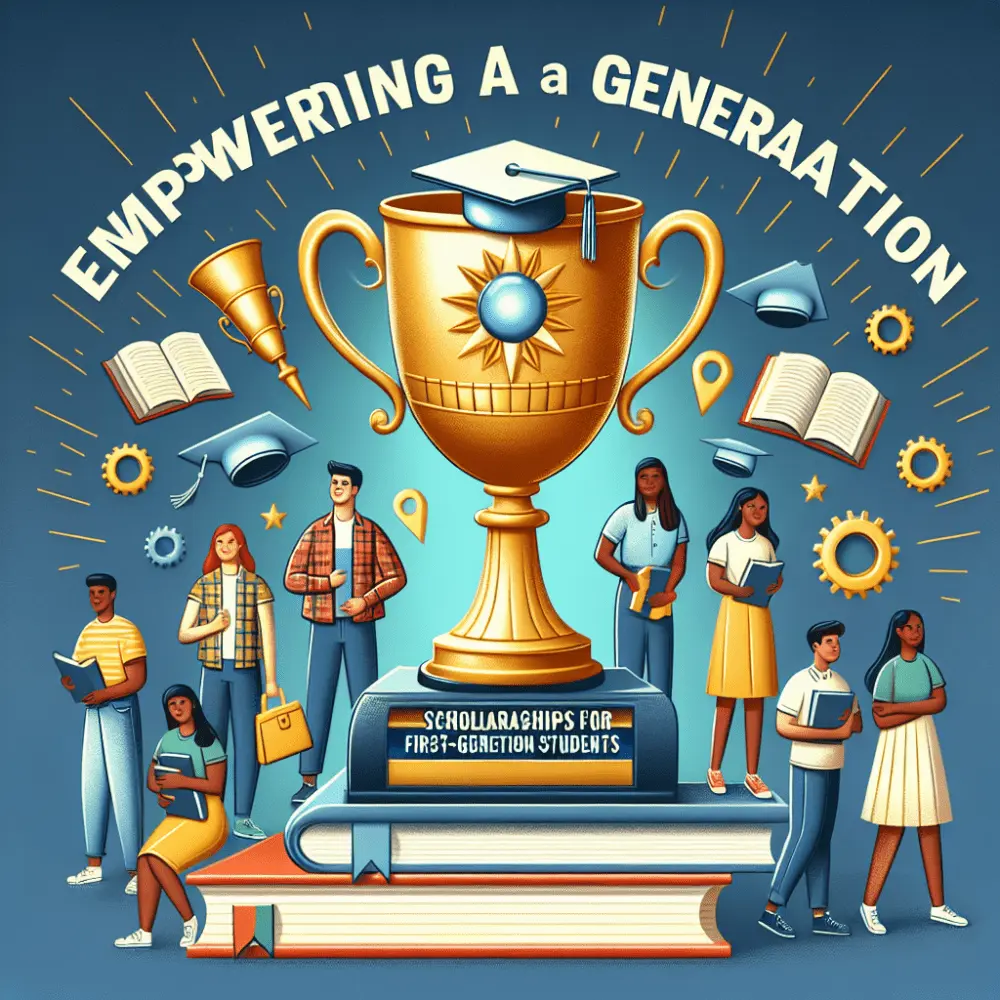For many first-generation students—those who are the first in their families to attend college—the journey to higher education can be challenging. These students often face unique obstacles, including financial constraints, a lack of familial guidance, and limited knowledge of the college admissions process. Recognizing the importance of supporting these students, various organizations, institutions, and government programs have created scholarships aimed specifically at first-generation students. These scholarships not only provide financial aid but also offer critical support that empowers students to pursue their academic and career goals.

The Importance of First-Generation Scholarships
First-generation students often come from low-income or underrepresented communities and may face numerous barriers to accessing higher education. Financial struggles are a common challenge, as many families cannot afford the rising costs of tuition, housing, and educational materials. Scholarships specifically for first-generation students help address this gap, making college more accessible and affordable.
Additionally, these scholarships acknowledge the perseverance and resilience it takes to be the first in one’s family to attend college. They provide recognition and encouragement, enabling first-generation students to focus on their education and thrive in academic environments that might otherwise feel overwhelming.
Types of Scholarships for First-Generation Students
Scholarships for first-generation students come in a variety of forms, from need-based awards to merit-based scholarships that recognize leadership, academic achievement, or community service. Here are some of the most common types:
- University-Sponsored Scholarships: Many colleges and universities offer their own scholarships for first-generation students. These scholarships may be part of broader programs aimed at increasing campus diversity and supporting underrepresented groups. For example:
- The First Scholars Program, offered by several universities, provides financial aid, mentorship, and academic support to first-generation students.
- The University of California’s Blue and Gold Opportunity Plan helps first-generation students cover the cost of tuition based on financial need.
- Nonprofit and Corporate Scholarships: Several nonprofit organizations and corporations offer scholarships to help first-generation students pursue higher education. Notable examples include:
- The Dell Scholars Program: This program provides financial aid and personalized support to first-generation and low-income students. It covers tuition, books, and living expenses while also offering ongoing mentorship.
- The Coca-Cola First Generation Scholarship: Awarded to students who are the first in their families to attend college, this scholarship recognizes leadership and academic achievement.
- State and Federal Scholarships: Some state governments offer programs specifically for first-generation students, alongside federal grants that help low-income students attend college. Examples include:
- New York’s Higher Education Opportunity Program (HEOP): This program provides financial assistance to first-generation students attending private colleges in New York.
- Federal Pell Grants: Though not exclusively for first-generation students, Pell Grants are a major source of need-based aid that helps many first-generation college students afford tuition.
How to Apply for First-Generation Scholarships
The process of applying for scholarships can be competitive, but with careful planning and preparation, first-generation students can increase their chances of success. Below are a few steps to guide the application process:
- Research Scholarship Opportunities: Begin by researching scholarships tailored to first-generation students. Look for national scholarships as well as opportunities offered by local organizations, businesses, and community groups.
- Complete the FAFSA: The Free Application for Federal Student Aid (FAFSA) is essential for most scholarship applications. Completing the FAFSA ensures that students are considered for federal, state, and institutional aid programs based on financial need.
- Prepare a Strong Personal Essay: Many scholarships require a personal essay or statement. This is an opportunity for students to share their unique story, including the challenges they’ve faced and how being a first-generation student has shaped their goals and ambitions.
- Gather Letters of Recommendation: Seek letters of recommendation from teachers, counselors, or mentors who know you well and can speak to your academic potential, leadership, and character. These letters can significantly strengthen a scholarship application.
- Apply Early and Stay Organized: Scholarship deadlines can vary, so it’s important to stay organized and submit applications well before the due dates. Keep track of deadlines and required materials to avoid last-minute stress.
Beyond Financial Support: Mentorship and Networking
Many first-generation scholarship programs go beyond providing financial aid; they also offer mentorship, academic advising, and networking opportunities. These resources are invaluable in helping first-generation students navigate the complexities of college life, from selecting courses to preparing for internships and career opportunities.
For example, the Jack Kent Cooke Foundation offers scholarships that come with access to a national network of scholars and academic advisors. Similarly, the Posse Foundation Scholarship helps students form small support groups, or “posses,” that foster a sense of community throughout their college journey.
Conclusion
Scholarships for first-generation students play a crucial role in bridging the financial gap and creating opportunities for students who may otherwise struggle to afford a college education. These scholarships not only ease the financial burden but also provide much-needed support and resources that empower students to succeed academically and personally.
By offering financial aid, mentorship, and academic guidance, these scholarships help first-generation students break through barriers and become leaders in their families and communities. With the right support, these students are equipped to achieve their dreams, set a new educational standard for future generations, and contribute to a more diverse and inclusive society.